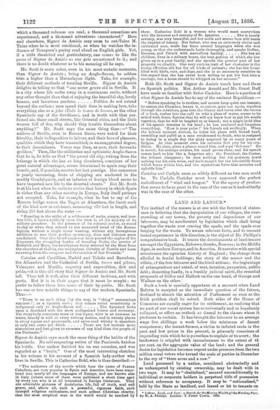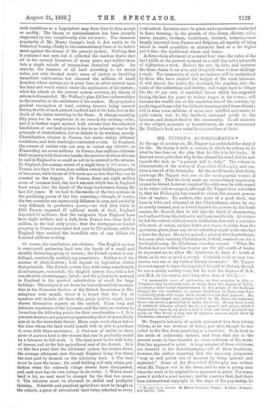LAND AND LABOUR.*
THE instinct of the masses is at one with the forecast of states- men in believing that the depopulation of our villages, the over-
crowding of our towns, the poverty and dependence of our labourers, may be ameliorated by legislation which shall bring together the waste uow craving the spade, and the spade ever longing for the waste. To amass relevant facts, and to recount
tested experiences in this direction, is the object of Mr. Phillips's comprehensive book. It traces the developments of land-tenure amongst the Egyptians, Hebrews, Greeks, Romans; in the Middle Ages, in modern Europe, and in America. It narrates with special minuteness the agrarian history of England ; the change from allodial to feudal holdings; the story of the manor and the villein, cf the free labourer and the hired artisan ; the beginnings of primogeniture and entail, of rent, taxation, pauperism, public debt ; dissecting finally, in a frankly judicial spirit, the remedial proposals of Giffen and Matlock on the one hand, of George and Wallace on the other:
Such a book is specially opportune at a moment when Land Reform is accepted as the immediate question of the future, destined to absorb the attention of Parliament so soon as the Irish problem shall be solved. Both sides of the House of Commons are equally eager for its settlement, as realising that no part of our social system has so universally and so hopelessly collapsed, or offers an outlook so dismal to the classes whom it professes to sustain. It has brought the labourer to an average wage five shillings a week below the minimum of decent competence ; the tenant-farmer, a victim to inflated rents in the past and low prices in the present, is piteously conscious of impending ruin which he is powerless to explain or to avert ; the landowner is crippled with inoumbrances to the extent of 41 per cent. on the aggregate value of the land ; and the general desire for legislation becomes urgent under pressure from the two million rural voters who turned the scale of parties in December to the cry of "three acres and a cow."
Land possessed by a nation, considered abstractedly and as unhampered by existing ownership, may be dealt with in two ways. It may be " chattelised," secured unconditionally to individual or corporate holders in perpetual title of possession without reference to occupancy. It may be "nationalised," held by the State as landlord, and leased or let to tenants on
• Labour, Land, and Law : a Search for the Kissing Wealthof the Working Poor. By W. A. Phillips. London: T. Fisher Unwin. 1106. such conditions as a Legislature may from time to time accept or modify. The theory of nationalisation has been recently supported by two exceptionally able advocates. The immense popularity of Mr. Henry George's book is due partly to its rhetorical beauty, chiefly to the extraordinary force of its indict- ment against the abuses of the present system. Nothing that it contained was new, but it collected the random shafts shot off in the current literature of many years, and welded them into a single missile of tremendous rhetorical weight. Its remedy, the taxation of all land according to its rental value, not only shocked men's sense of justice as involving immediate confiscation, but alarmed the millions of small hoarders whose savings are in some form or other secured upon the land and would vanish under the application of his system ; while his attack on the present system survives, his theory of reform is disregarded. Mr. Wallace's plan did less violence either to the morality or the selfishness of his readers. He proposed a gradual resumption of land, existing tenures being secured during the life of each present landlord and of his heir, but on the death of the latter reverting to the State. A change requiring fifty years for its completion is no remedy for existing evils ; and it is further urged against both reforms that the admitted breakdown of our land system is due to no inherent vice in the principle of chattelisation, but to defects in its working merely. Chattelisation obtains in France, but under widely different conditions, and with startingly contrasted results. In England, the owners of estates over one acre in extent are 320,000 ; in France they are seven millions. In France, four millions cultivate their property with their own hands; the number of whom this can be said in England is so small as not to be entered in the returns. In England, the average extent of a single farm is 390 acres ; in France, less than 10 acres, four million owners holding properties of two acres, while farms of 200 acres are so few that they can be counted on the fingers. In France, there are eight million acres of common land, the exact amount which has in England been swept into the hands of the large landowners during the last 150 years. If we look to the results of the two systems in the producing power of the two countries,—though, of coarse, the two countries are enormously different in area, and probably very different in productive power,—we find that while in 1880 France exported 27 millions' worth of food, England imported 80 millions; that the emigrants from England have been eight millions and a half, from France less than half a million, in the last sixty years ; that the mortgages on landed property in France amounted last year to 770 millions, while in England they reached the incredible sum of one billion six hundred millions sterling.
Of course, the conclusions are obvious. The English system is centripetal, gathering land into the hands of 'a. small and steadily decreasing group of owners ; the French system is cen- trifugal, continually multiplying proprietors. Neither is of the essence of chattelisation; both depend on legislation within that principle. The French system has, with many considerable disadvantages, succeeded ; the English system has, with a few considerable advantagages, failed ; and the policy to be pursued in England is the gradual substitution of small for large holdings. The subject is set down for leisurely and full examina- tion in the Economic Section of the British Association at Bir- mingham next month, where it is hoped that the list of speakers will include all those who, party politics apart, have shown themselves experts on the subject. From long and intimate experience of the labourers and the land, we venture to formulate the following points for their consideration :-1. It is peasant-tenan cy, not peasant-proprietorship, that we must chiefly aim at in the immediate future. Many years must elapse before the class whom the land would benefit will be able to purchase it, even with State assistance. 2. One acre of arable or three acres of pastureland is the utmost that can be profitably rented by a labourer in full work. 3. The land must be let with fixity of tenure, and at the fair agricultural rent of the district. It is on this last point that the allotment system has broken down, the average allotment rent through England being four times the rent paid by farmers on the adjoining land. 4. The land must be near the home ; the small holding will only attain per- fection when the unlovely village streets have disappeared, and each acre has its own cottage in its midst. 5. Where waste land is let, no rent must be charged for the first two years. 6. The labourer must be educated to skilful and profitable farming. Scientific and practical agriculture must be taught in the schools, a piece of educational land being attached to every
rural school. Lectures must be given and experiments conducted in fancy farming ; in the growth of flax, hemp, chicory, coiza, maize, poppies, henbane, buckwheat, rhubarb, tobacco,—now largely imported from France and Belgium, all capable of being raised in small quantities on allotment land at a far higher proSt than the traditional wheat and beans.
A three-chain allotment at a rental four limes the value of the land yields at the present moment on a stiff clay soil a net profit of eightpence a week. Reduce the rent by four, and increase the three chains to an acre, and the profit rises to four shillings a week. The immensity of such an increase will be understood by those who have studied the budget of the rural labourer. It will absorb the loafer, the drunkard, the poacher, into the ranks of the industrious and thrifty ; will tempt back to village life the 20 per cent. of unskilled labour which has migrated during the last ten years to reduce wages in the towns ; will increase the wealth not of the capitalist but of the country, by producing at home what has hitherto been imported from abroad ; will in time cause millions of acres, now untilled and waste, to yield certain rent to the landlord, increased profit to the labourer, and cheaper food to the community. To all students of the subject, economic or humanitarian, we can recommend Mr. Phillips's book as a valuable compendium of facts.



































 Previous page
Previous page